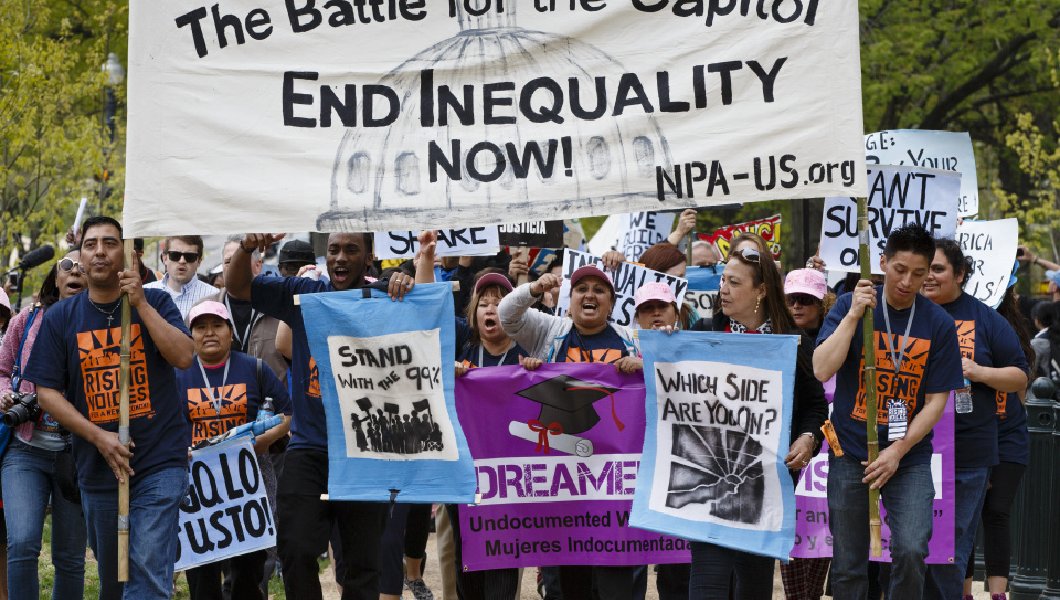Proposed D.C. Minimum Wage Increase Could be a Job Killer
By Erik Telford
WashingtonExaminer.com

If the activists behind
the ballot measure gather 25,000 signatures in
support of the measure by November 2016, D.C. voters
will be allowed to vote on whether they want the
higher minimum wage. (AP Photo)
Just a little over a year after the Washington D.C. City Council voted to increase the minimum wage in the District from $8.25 to $11.50 an hour, activists are seeking to increase it again — this time to $15 an hour. While the $4.50 pay raise might help some minimum wage workers in the District, many other less fortunate D.C. residents will remain jobless and some could even lose their jobs.
In July, the D.C. Board of Elections approved the language for the ballot initiative dubbed the "Fair Minimum Wage Act of 2016." If the activists behind the ballot measure gather 25,000 signatures in support of the measure by November 2016, D.C. voters will be allowed to vote on whether they want the higher minimum wage. The ballot measure is already being contested by D.C. Chamber of Commerce President Harry Wingo, who filed a civil lawsuit (as an individual) against the D.C. Board of Elections to stop the signature drive. Wingo'sgrievances are that the ballot initiative would exempt D.C. government contractors from the increase and hurt small businesses in the city.
Both of Wingo's criticisms are true, but beyond being applied unfairly and hurting small businesses, a minimum wage increase in D.C. would hurt the unemployed and minimum wage workers themselves.
Look no further than what could have happened if a proposed D.C. "living wage" bill hadn't been struck down by former Mayor Vincent Gray in 2013. That year, the Large Retailer Accountability Act easily passed the D.C. City Council and went to Mayor Gray's desk for approval, where he vetoed it. The bill would've increased the minimum wage paid by large retailers to $12.50 an hour. Large retailers like Wal-Mart would have been particularly hard hit by this legislation. At the time, the retailer was in the process of opening two new stores in D.C. and threatened to withdraw from the District, taking with it thousands jobs, if the bill were to be implemented.
Luckily for the 1,800 people the D.C. Walmart stores now employ, that particular minimum wage increase was vetoed and residents instead received a slightly more modest minimum wage increase applied to all businesses.
Increasing the current D.C. minimum wage, which hasn't even been allowed to reach its max yet (the $11.50 per hour wage doesn't kick in until 2016) is a recipe for economic disaster with many unseen costs. Companies will balk at opening stores in the District because of the proposed minimum wage increase, but this time around there isn't a Walmart, with jobs already lined up for people, to make the effects of the abstract economic concept of price floors so very real.
But it's not just the unemployed seeking work who will be harmed if this ballot initiative moves forward. Those already employed in minimum wage occupations could be priced out of their jobs.
A new report from the American Enterprise Institute finds that Seattle's minimum wage increase to $15 an hour cost the city 1,300 restaurant jobs from January to June 2015 — the largest decline in Seattle's restaurant jobs since the Great Recession. Data suggest that the loss in these jobs is directly attributable to Seattle's minimum wage increase, because at both the national and state levels, restaurant employment increased over the same period of time and the overall employment rate in Seattle also increased.
The Congressional Budget Office has also published research indicating that an increase in the federal minimum wage from its current level, $7.25 an hour, to $10.10 per hour would cost about 500,000 jobs nationwide.
Minimum wage hikes don't just get in the way of job creation; they also kill jobs. What happened in Seattle is a perfect example of that. If the proposed minimum wage increase gets on the ballot in 2016, D.C. voters should carefully consider the very real costs they will incur.
Erik Telford is the president of the Franklin Center for Government & Public Integrity. Thinking of submitting an op-ed to the Washington Examiner? Be sure to read our guidelines on submissions.
